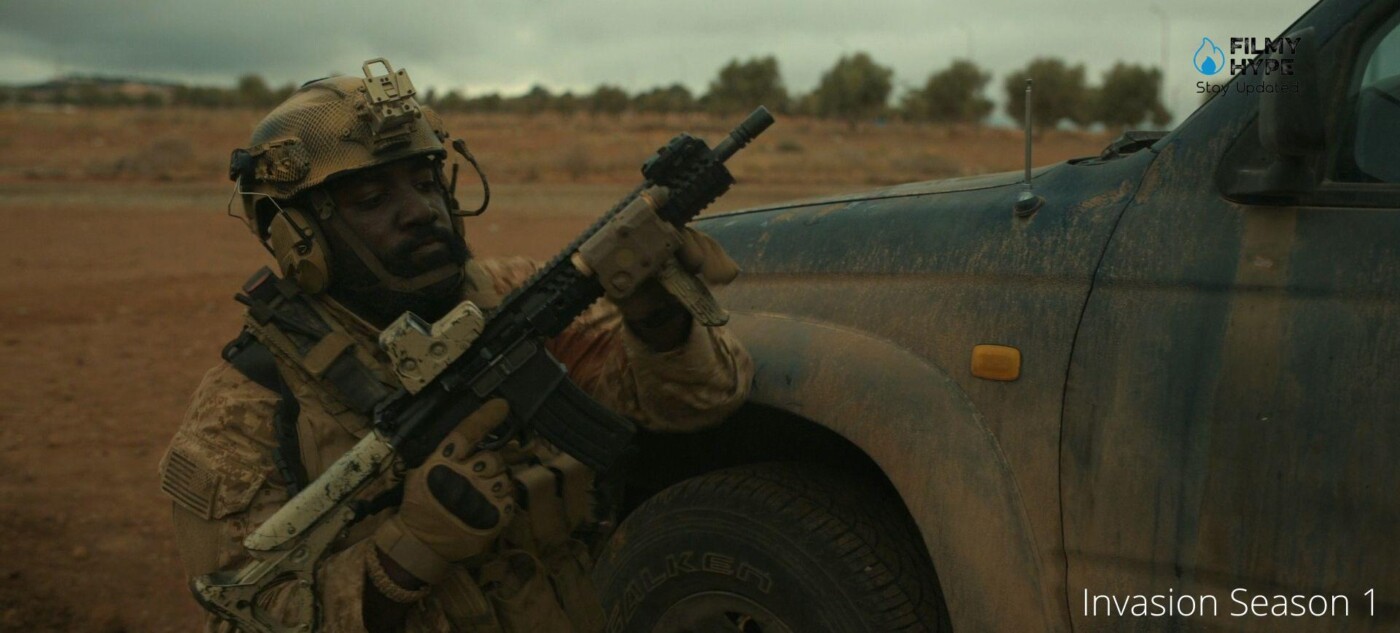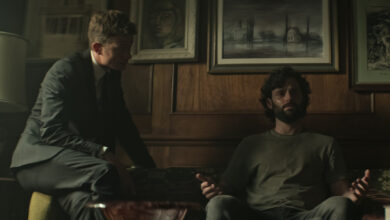Invasion Episode 5 Review: Reaching The Point Of No Return Atypical Point Of View| Apple Tv+ Series
Director: Jakob Verbruggen, Amanda Marsalis
Cast: Shamier Anderson, Golshifteh Farahani, Sam Neill, Firas Nassar, Shioli Kutsuna, Billy Barratt
Streaming Platform: Apple Tv+
Ratings: 3.5/5 (three and half star)
This is the first thought that occurred to us when the credits arrived and this is how we want to begin our review of the fifth episode of Invasion. The series created by Simon Kinberg and David Weil, available on Apple TV+, remains faithful and consistent with the choice to tell the alien invasion through the various points of view of the characters and curbing the spectacular in favor of an intimate and fragmented story, which gives the viewer essential and measured details and clues of what is happening. In a shorter-than-usual episode (just over 40 minutes) that acts as splitting the season in two halves, the game takes a step back and a step forward at the same time, for different reasons.

Invasion Episode 5 Review: The Story
As in the previous episode, the story of Invasion seems to have put aside the character played by Sam Neill, who instead had opened the dance in the first episode. Minutes dedicated, consequently, to the other four protagonists of the story, each struggling with a different situation, from which the union arises a global story that only the spectator can reconstruct. At the plot level, the story seems to deepen once more the personal dimension of the protagonists, overshadowing a real narrative development. Trevante will discover a ghost military base, Aneesha will leave the house to search for supplies, Mitsuki will be grappling with a dialogue in a room, and Caspar, along with his peers, will find a truck along the way.
Episodes that taken individually have the flavor of fillers and that reinforce the feeling of stasis, but which in their essentiality show how the world around the characters is slowly changing. It is the most fascinating aspect of the series, that of the slow decline of the world: you can see it from the context in which the characters are inserted, from the settings in which they move and from what happens in the background. There remains a tension which, precisely because of its dilated progress, acquires more and more an apocalyptic and majestic flavor. from the settings in which they move and from what happens in the background. There remains a tension which, precisely because of its dilated progress, acquires more and more an apocalyptic and majestic flavor. from the settings in which they move and from what happens in the background. There remains a tension which, precisely because of its dilated progress, acquires more and more an apocalyptic and majestic flavor.
The Review and Analysis
Should a rhythm so settled on itself be considered as a virtue or a defect? This is a question that, in the middle of the season, can no longer be avoided. The nature of the work is placed in an almost hybrid context, in which the positive and negative aspects neutralize each other, where the story never seems to proceed and yet (as also happens in this episode) in the end we realize that a development c ‘it actually was with respect to where it started. On the other hand, this very original narrative choice could discontent and put the spectator’s patience to the test, week after week. One would wonder if the weekly release was the most appropriate choice for the type of product, if the approach would have been softened by having the whole season ready for bingewatching. But at what cost? Invasion thrives on waiting, slowness, stasis: it is the reason that makes it so special and it is what builds its raison d’etre, its functioning. It is up to the individual viewer to choose whether to participate in the game wanted by Kinberg and Weil, in the hope that from the next episode the pace may begin to change slightly.
Because the finale of this fifth episode of Invasion marks a point of no return. If so far many things had remained pending and undefined by the characters themselves, the last minutes of Homecoming (this is the title of the episode) leave no more escape for interpretations. Finally, a more ingrained change takes place in the way the characters will act in the next installments, aware of the situation they are experiencing and finally giving the situation a name: an alien invasion. This first half of the season may have been a long prologue that, while it probably won’t explode right away with the show and the action, is now definitely over. The feeling is that the circle is shrinking more and more, also thanks to the uncompromising staging. We want to focus on a particular sequence, which has to do with a surgical operation. It’s an important scene that initiates change, yet it happens by showing impressionable images without filters that could alienate some sensitive viewers. In this game all the fun of Invasion is fulfilled: looking at what seems to be motionless, moving forward when you are tempted to look away. What do we decide to do?
The Final Words
At the conclusion of our review of the fifth episode of Invasion we can continue to appreciate the slow progress of the story consistent with the previous episodes. Despite a final part that causes a strong change within the narrative system leaving a lot of curiosity for the second half of the season, we cannot however notice how this fifth episode is largely a passing episode in which you often have the feeling that happens too little. The weekly release of the episodes helps build tension but can also (as is the case for much of these 40 minutes) put a strain on the viewer who may not feel so heavily involved in the affair.
Positive Sides
- The staging manages to tell the story, showing a world increasingly in chaos.
- The final sequence marks a point of no return for the series.
- The dilated rhythm works in the construction of tension …
Negative Sides
- But by the middle of the season, and with the weekly release of the episodes, it could put a strain on the viewer’s patience.
- Taken individually, the characters’ stories seem too stuck on themselves.







One Comment